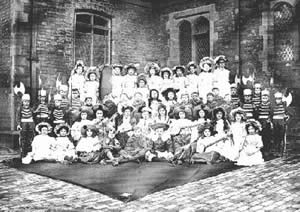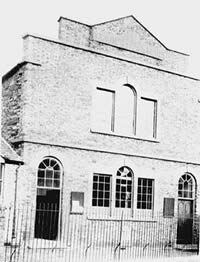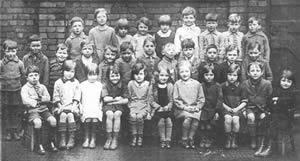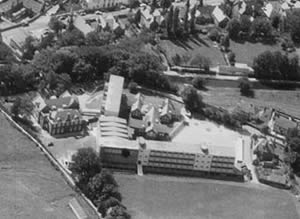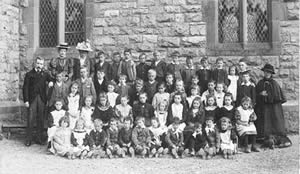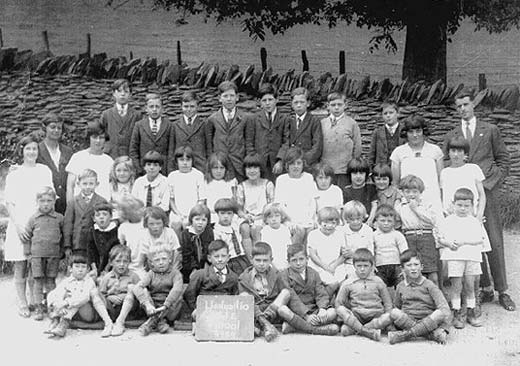Schools
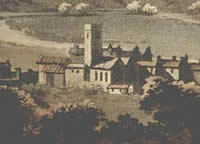 The
first record of a school in Llangollen comes around the year
1700 from the St Collen's churchwardens' accounts. At this
time, the sum of 8 shillings was paid for mending a door between
the church and the school, indicating that, at the start of
the 18th century, the school was attached to the church. The
first record of a school in Llangollen comes around the year
1700 from the St Collen's churchwardens' accounts. At this
time, the sum of 8 shillings was paid for mending a door between
the church and the school, indicating that, at the start of
the 18th century, the school was attached to the church.
In 1726, there is another mention
when 1 shilling and sixpence was 'payd for a warrant
to remove ye schoolmaster'.
Another early reference to education
in Llangollen was that of the Dame School run by Maria Edwards,
wife of the infamous Barber of Llangollen who cut his wife’s
throat in front of the children. In the 19th century, W.T.
Simpson wrote of the existence of a school in the churchyard
(which had been founded in 1773). In 1840, this developed
into the National School.

|
| The 19th century also saw the
opening of schools in the outlying villages of Llantysilio,
Pentredwr, Eglwyseg and Garth, some of which have closed and
some that are still going strong. |
 top of page top of page |
|
In the 19th century, W.T. Simpson wrote of
the existence of a school in the churchyard (which had been
founded in 1773). In 1840, this developed into the National
School. Following the education act of 1870, the school was
greatly enlarged and the new building opened in October 1873
with a procession led by a drum and fife band.
|
 top of page top of page |
|
The British School was opened
in 1846 having moved from its temporary accommodation in the
Rehoboth Chapel. One of the first students at the school was
Mary Thomas, who was born in 1842 at Ty Issa Farm, Llangollen.
She came here, to the school along with 200 other pupils.
With her she brought her pet lamb Billy who apparently caused
mayhem in class and had to be put out into the playground.
Mary’s schoolmates used to pat the lamb through the
railings of the playground.
In 1861 Mary married Thomas
Hughes, a mining engineer from Cefn Mawr and they went on
to have 11 children before Thomas died at 47. Mary lived to
be 89 years old and died in Worthing.
She is buried here in Fron
Bache cemetary, Llangollen, along with her father John Thomas,
and on the tombstone is the inscription “Also in affectionate
remembrance of his daughter Mrs Mary Hughes who died in Worthing
in 1931, aged 89 years old. Heroine of the nursery rhyme Mary
had a little lamb”.
This is a lovely folklore story,
but sadly Mary Thomas of Llangollen was not the heroine of
the nursery rhyme. Why she died believing she was is not clear.
She was given a copy of the poem by visitors from London –
did this copy lead Mary to believe that she was its heroine?
The Mary of the rhyme was Mary
Sawyer and the school was the Redstone Schoolhouse in Sterling
Massachusetts, U.S.A. The original nursery rhyme was written
in America in 1815 by John Roulstone, and was first published
in a magazine called Juvenile Miscellany in 1830, 12 years
before Mary Thomas of Llangollen was born!
|
 top of page top of page |
|
|
The Board School was opened in October 1874
in Parade Street with a procession led by a brass band. Today
the building is occupied by the European Centre for
Traditional and Regional Cultures (ECTARC). The Board School
is now incorporated into Ysgol Bryn Collen at Pengwern.
|
|
|
Walton House School was
opened in 1887 and provided
what we would recognise as co-educational secondary education.
After the 1889 Education Act a committee was formed to secure
the establishment of an Intermediate School for Llangollen and
district. The governors began fundraising for a new building,
but in 1895 opened the school in temporary accommodation in
Plas Geraint, formerly the Baptist Theological College. There
was now no further need for Walton House, which closed.
The site of Pen y Bont field
was purchased for the new building, which was completed in
1898 of Ruabon red brick. The County School was opened in
September 1898, with the first headmaster being Henry R. Olley.
Under his leadership the County School prospered and a new
science building was opened in 1913. With the 1944 Education
Act the school became the Grammar School and, after much new
building work, became a bilateral school in 1960, with the
name becoming Dinas Brân
School. |
  top of page top of page |
|
St. Mary’s Church was
built in 1871, to relieve some of the overcrowding in Llangollen
church and to provide a local school. It stopped acting as
a school when the school in nearby Pentredwr was built in
1908, but continued as a church, holding it’s last service
in 1985.
Ty Newydd, the house next door,
was known as the School House, because Robert Oliver, the
schoolmaster lodged there.
|
  top of page top of page |
|
Llantysilio School was built in 1858 on half
an acre of land given by Major Charles John Tottenham of Plas
Berwyn. The deed stated that the buildings erected on the land
were 'to be used as a school for the education of
children and adults, or children only of the labouring and
manufacturing or other poorer classes in the said parish, and
for no other purpose'. An additional cloakroom extension
was added to the building in the 1950s. The school seems
always to have been an excellent centre for education. In 1914
the school inspection report said 'This school maintains
its high reputation for educational standards and religious
teaching'. Llantysilio School continues to maintain its
high reputation, with over 40 pupils being taught by dedicated
staff, a large range of activities and an active after school
club. Here can be seen the staff and pupils of the school in
1929.
|
 |
|
Pentredwr School was built in 1908 to provide
a dedicated place for the education of the local children.
Catering for between 30 and 40 children over much of its lifetime,
it closed in the 1980s.
|
top of page
|
|
|
 The
first record of a school in Llangollen comes around the year
1700 from the St Collen's churchwardens' accounts. At this
time, the sum of 8 shillings was paid for mending a door between
the church and the school, indicating that, at the start of
the 18th century, the school was attached to the church.
The
first record of a school in Llangollen comes around the year
1700 from the St Collen's churchwardens' accounts. At this
time, the sum of 8 shillings was paid for mending a door between
the church and the school, indicating that, at the start of
the 18th century, the school was attached to the church.
